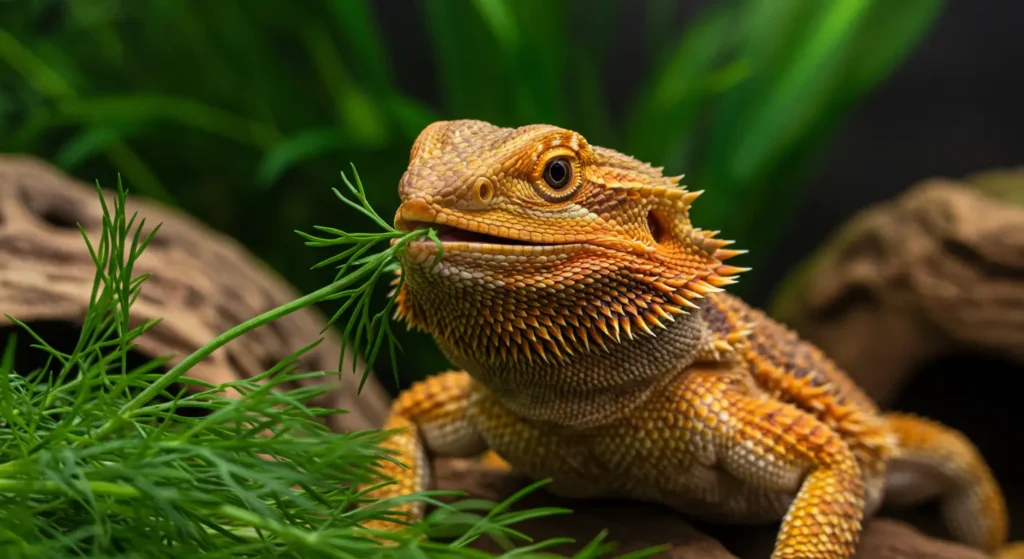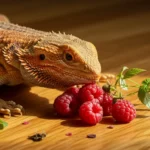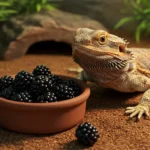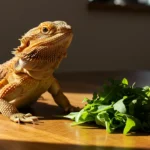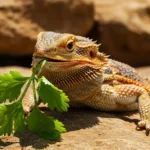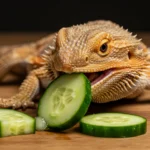If you’ve ever watched your bearded dragon happily munch on leafy greens, you might wonder, can bearded dragons have dill? This fresh, aromatic herb adds flavor to our meals, but when it comes to reptiles, not every plant is safe. Many owners also ask, can bearded dragons have dill every week, or should it only be an occasional snack?
Dill can be a healthy addition to your pet’s diet when offered the right way. It’s rich in vitamins, minerals, and hydration, making it tempting to include more often. But like many herbs, it also has drawbacks that every bearded dragon owner should understand.
In this guide, we’ll explore the nutritional benefits, potential risks, and safe serving methods for dill. You’ll learn exactly how much to give, how often to offer it, and what other herbs can balance your dragon’s diet. By the end, you’ll know how to let your bearded dragon enjoy dill safely, without affecting their long-term health.
Can Bearded Dragons Have Dill? Safe Feeding Guidelines
When considering new foods for your bearded dragon, it’s essential to know which plants are safe and nutritious. Dill is a common herb that owners often wonder about. This section explores how dill fits into their diet and what to watch for when feeding it.
Can Bearded Dragons Eat Dill Leaves and Stems?
Yes, bearded dragons can safely eat dill leaves and stems, but it’s important to offer them in moderation. The leaves of dill are soft, making them easy to chew and digest, which fits well into a bearded dragon’s herbivorous diet. However, the stems tend to be tougher and fibrous, so they should be chopped finely or offered in very small amounts to avoid any choking hazard. Dill leaves provide beneficial nutrients like vitamins A and C, which help support immune function and maintain healthy skin in your reptile. On the other hand, dill also contains oxalates—naturally occurring compounds that can interfere with calcium absorption if fed excessively. Since calcium is essential for strong bones and overall health, dill should never replace staple greens like collard or mustard greens. Additionally, always ensure the dill you feed your bearded dragon is fresh, thoroughly washed, and free from pesticides or harmful chemicals. This careful approach helps keep your pet safe and healthy while enjoying dill as a tasty addition to their diet.
Is Dill Safe for Bearded Dragons as a Fresh Herb Treat?
Dill can be a safe and enjoyable treat for bearded dragons when offered fresh and in limited quantities. Fresh dill leaves provide moisture and a range of essential nutrients that complement the main components of your dragon’s diet. Importantly, dill is non-toxic and does not contain any harmful substances at levels that pose a risk when fed appropriately. However, it’s crucial to introduce dill gradually, especially if your bearded dragon has never tried it before. This gradual introduction allows you to monitor for any potential digestive upset or allergic reactions. Dill should always be treated as a supplementary treat rather than a main food source to ensure your pet receives a well-balanced diet. Offering dill occasionally adds variety and interest to mealtime, helping prevent your dragon from becoming bored with its food. When included thoughtfully, fresh dill serves as a healthy and tasty herb that supports your bearded dragon’s dietary needs.
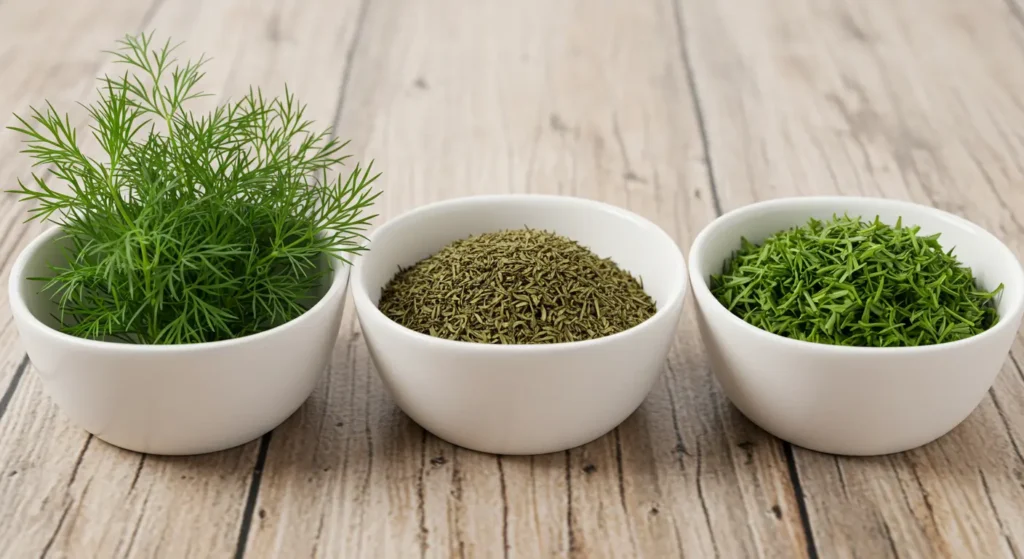
How Often Should Bearded Dragons Have Dill in Their Diet?
Dill should be fed to bearded dragons sparingly, with a recommended frequency of about once or twice per week. This limited feeding schedule helps reduce the risks associated with dill’s oxalate content, which can bind to calcium and lower its absorption in your pet’s body. Calcium is vital for maintaining strong bones and preventing metabolic bone disease, so managing oxalate intake is essential. Overfeeding dill or other herbs high in oxalates may lead to nutritional imbalances that could negatively affect your dragon’s health. A good practice is to serve dill as a small portion alongside a variety of other safe greens and vegetables, ensuring a diverse and balanced diet. Younger or growing dragons require even more careful attention to calcium intake, so dill feeding frequency should be controlled accordingly. Always wash dill thoroughly to remove any pesticides or contaminants before offering it, and watch your bearded dragon closely for any signs of digestive discomfort after introducing new foods.
Can Bearded Dragons Have Dill as a Nutritious Herb?
Dill is more than just a flavorful herb; it can offer some nutritional benefits to bearded dragons when included correctly in their diet. Understanding these benefits helps you make informed decisions about feeding dill safely and effectively.
Health Benefits of Feeding Dill to Bearded Dragons
Feeding dill to bearded dragons offers a variety of health benefits, especially when included in moderation as part of a balanced diet. Dill is rich in antioxidants, which play a crucial role in reducing inflammation and supporting the immune system. These antioxidants help protect your pet’s cells from damage caused by free radicals, promoting overall wellness.
In addition to antioxidants, dill contains natural compounds that can aid the digestive process. These compounds help stimulate the production of digestive enzymes, making it easier for your bearded dragon to break down and absorb nutrients from their food. This can be particularly helpful for dragons that may experience occasional digestive issues.
Moreover, dill has mild antimicrobial properties that contribute to maintaining a healthy gut environment by inhibiting the growth of harmful bacteria. A healthy digestive system is essential for nutrient absorption and overall vitality.
While dill should never replace staple vegetables, adding it occasionally as a supplement enhances the diet with these health-promoting properties. When combined with other nutrient-rich greens and vegetables, dill can support your bearded dragon’s health, boost their immune function, and improve digestion, making it a valuable addition to their feeding routine.
Vitamins, Minerals, and Hydration From Dill
Dill is a valuable herb for bearded dragons because it contains several essential vitamins and minerals that support their overall health. Notably, dill is rich in vitamin A and vitamin C, both vital for maintaining good vision, healthy skin, and a strong immune system. Vitamin A helps with cell growth and repair, while vitamin C acts as a powerful antioxidant that protects the body from illnesses.
Beyond vitamins, dill provides small but important amounts of minerals such as calcium, potassium, and magnesium. Calcium is especially critical for bearded dragons because it strengthens bones and prevents metabolic bone disease. Potassium and magnesium contribute to proper muscle function and overall metabolic processes, supporting your pet’s energy levels and mobility.
In addition to its nutrient content, dill has a high water content that helps keep your bearded dragon hydrated. Proper hydration is essential for digestion and maintaining healthy organ function. Offering fresh dill leaves not only supplies nutrients but also adds moisture to your pet’s diet. This combination makes dill a hydrating and nutritious herb that can positively contribute to the daily dietary needs of your reptile.
Why Some Owners Include Dill in a Bearded Dragon’s Meals
Many bearded dragon owners choose to include dill in their pets’ meals due to its appealing aroma and mild, pleasant flavor. This herb can help add variety to a reptile’s diet, which is important to prevent boredom from eating the same greens and vegetables repeatedly. Variety in diet also encourages healthy eating habits and ensures a broader range of nutrients.
Dill’s nutritional profile, which includes vitamins, minerals, and antioxidants, makes it a convenient and beneficial supplement to staple foods. Its easy digestibility means that bearded dragons can enjoy dill without experiencing digestive issues common with some other plants. This makes dill a popular choice for many owners looking to enrich their pet’s meals.
Owners who regularly feed dill often notice their bearded dragons show increased interest and enthusiasm during feeding time. Including dill occasionally can make mealtime more exciting while contributing to a balanced and enriched diet. Overall, dill supports both the health and happiness of bearded dragons when used as part of a varied feeding routine.
Can Bearded Dragons Have Dill Every Week? Risks and Limits
Feeding dill to bearded dragons can offer benefits, but it’s important to understand the risks of overfeeding. This section explains how often dill should be included in their diet and highlights potential limits to keep your pet healthy. Knowing the right balance helps prevent nutritional issues and supports your dragon’s wellbeing.
Oxalates in Dill and Their Impact on Calcium Absorption
Dill contains compounds called oxalates, which can affect calcium absorption in bearded dragons. Oxalates bind to calcium in the digestive tract, making it harder for the body to absorb this vital mineral. Calcium is essential for strong bones, muscle function, and overall reptile health. If too much oxalate-rich food like dill is consumed, your bearded dragon may develop calcium deficiencies over time. This can lead to metabolic bone disease, a serious condition that weakens bones and causes deformities.
Because of the presence of oxalates, dill should be fed only in moderation. Balancing dill with other low-oxalate greens, such as collard or mustard greens, helps ensure your pet gets enough calcium. It’s also important to provide a calcium supplement if your dragon’s diet includes herbs that contain oxalates. Regularly monitoring your bearded dragon’s health and feeding habits can help prevent calcium-related issues caused by oxalate interference.
Possible Digestive Upsets From Too Much Dill
Feeding your bearded dragon too much dill can cause digestive problems. While dill offers nutritional benefits, excessive amounts may overwhelm your pet’s digestive system. Overfeeding can lead to symptoms such as diarrhea, bloating, or soft stools. These issues occur because the digestive tract struggles to process large quantities of certain compounds in dill.
Each bearded dragon reacts differently to new foods, so it is important to introduce dill gradually. Start with small amounts to observe how your pet’s digestion responds. If you notice any signs of discomfort or irregular bowel movements, reduce or stop feeding dill temporarily. Maintaining a varied diet with a balance of leafy greens, vegetables, and occasional herbs like dill can help avoid digestive upset and promote long-term gut health.
Reducing Risks With Organic Dill and Proper Washing
To minimize health risks when feeding dill, always choose organic dill if possible. Organic dill is grown without harmful pesticides or chemicals that can be dangerous to bearded dragons. Conventional herbs may carry residues that upset your pet’s digestive system or cause illness.
Before feeding dill to your bearded dragon, thoroughly wash the leaves and stems under cool running water. This helps remove dirt, bacteria, and any remaining chemicals. Using a gentle brush can aid in cleaning tougher stems. Proper washing also reduces the risk of parasites or mold that could harm your pet.
Using organic dill and practicing good hygiene when preparing it ensures your bearded dragon enjoys a safe and healthy treat. These steps help protect your reptile’s digestive system and overall wellbeing while allowing them to benefit from dill’s nutritional qualities.
Can Bearded Dragons Have Dill Prepared in Different Ways?
Dill can be offered to bearded dragons in several forms, but not all preparations are equally safe or nutritious. This section explores the best ways to prepare dill for your pet and how different methods can affect its benefits. Understanding these options ensures your dragon enjoys dill safely and healthily.
Fresh vs. Dried Dill — Which Is Best for Bearded Dragons?
Fresh dill is generally the best choice for bearded dragons because it retains more nutrients and moisture. The high water content in fresh dill helps with hydration, which is essential for your pet’s digestion and overall health. Fresh leaves also have a stronger aroma and flavor, making them more appealing to many reptiles.
Dried dill, on the other hand, loses some vitamins and minerals during the drying process. It has little to no moisture and can be harder for your bearded dragon to digest. Additionally, dried herbs may contain preservatives or additives that are not ideal for reptiles.
While dried dill can be used occasionally, fresh dill should be the preferred option. Always ensure the fresh dill is clean and pesticide-free before feeding. Offering fresh dill helps maximize nutritional benefits and encourages your bearded dragon to enjoy a variety of textures in its diet.
Serving Dill Chopped, Mixed, or as a Garnish
How you serve dill can affect your bearded dragon’s ability to eat and digest it properly. Chopping dill into small pieces makes it easier for your pet to chew and prevents choking hazards, especially for younger dragons. Finely chopped dill can be mixed with other greens and vegetables to create a balanced meal that offers varied flavors and nutrients.
Serving dill as a garnish—sprinkled lightly on top of staple foods—is another effective way to introduce the herb without overwhelming your pet. This method also encourages curiosity and increases interest in mealtime.
Avoid giving large, whole sprigs, as they can be tough and difficult to eat. By chopping or mixing dill appropriately, you help your bearded dragon enjoy this herb safely while benefiting from its nutritional properties.
Dill Portion Sizes for Juvenile and Adult Dragons
Portion size is important when feeding dill to bearded dragons to prevent overfeeding and related health risks. Juvenile dragons have smaller digestive systems and higher calcium needs, so they should receive very small amounts of dill—about one to two teaspoons mixed into their meals once or twice a week.
Adult bearded dragons can handle slightly larger portions but should still have dill in moderation. A tablespoon of chopped dill served once or twice weekly is usually sufficient to add variety without causing nutritional imbalances.
Always observe your pet’s response to new foods and adjust portions accordingly. If your bearded dragon shows signs of digestive upset, reduce or pause dill feeding. Proper portion control supports healthy digestion and ensures your pet receives a balanced diet.
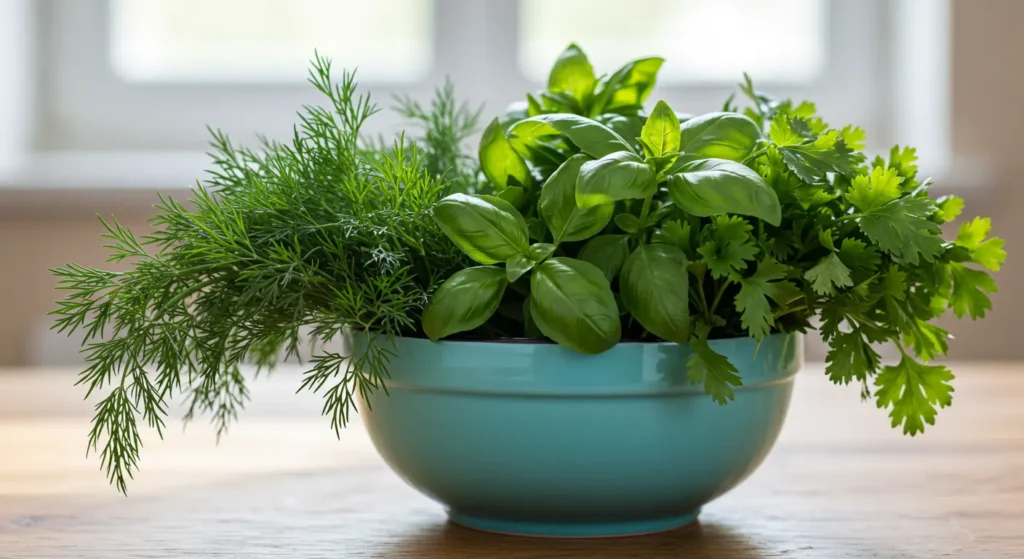
Can Bearded Dragons Have Dill Alongside Other Safe Herbs?
Bearded dragons thrive on a varied diet that includes a range of safe herbs and greens. This section explores how dill can be combined with other reptile-friendly herbs to create a balanced and nutritious meal plan. Understanding which herbs work well together helps support your dragon’s overall health.
Combining Dill With Basil, Parsley, and Cilantro
Dill pairs well with other safe herbs like basil, parsley, and cilantro to offer your bearded dragon a flavorful and nutritious diet. Basil adds essential vitamins and has anti-inflammatory properties that benefit your pet’s health. Parsley is rich in vitamins A and C, supporting immune function and skin health. Cilantro provides antioxidants and helps with detoxification.
Mixing dill with these herbs adds variety and encourages your bearded dragon to explore different tastes and textures. This can help prevent picky eating and promote a balanced diet. When combining these herbs, always chop them finely to make eating easier and to avoid choking hazards. Feed these herbs in moderation to maintain a balanced intake of nutrients and avoid overwhelming your dragon’s digestive system.
Using a blend of dill, basil, parsley, and cilantro in small portions ensures your bearded dragon enjoys a diverse and healthful diet that supports overall wellbeing.
Balancing Dill With Leafy Greens Like Collards and Mustard Greens
While dill provides valuable nutrients, it should be balanced with leafy greens such as collard and mustard greens, which are staples in a bearded dragon’s diet. Collards and mustard greens are rich in calcium, which is vital for bone strength and growth. These greens contain lower levels of oxalates compared to dill, making them safer as primary greens.
Balancing dill with these nutrient-dense greens helps prevent calcium deficiencies and ensures your dragon receives a well-rounded diet. You can mix small amounts of dill into larger portions of collards or mustard greens. This approach offers nutritional variety without compromising calcium absorption or digestive health.
Always rotate the types of greens you offer to maintain variety and prevent nutritional imbalances. A balanced mix supports your bearded dragon’s long-term health and growth.
Herbs and Plants to Avoid in a Bearded Dragon’s Diet
Not all herbs and plants are safe for bearded dragons. Some contain toxins or compounds that can harm your pet’s health. For example, avocado leaves and fruit are toxic and should never be fed. Rhubarb contains oxalates at harmful levels and can cause kidney damage. Onions, garlic, and certain flowers like foxglove are also dangerous.
It’s important to research any new herb or plant before offering it to your bearded dragon. Avoid plants that are high in oxalates or goitrogens, as these can interfere with calcium absorption and thyroid function. Stick to well-known safe options like collard greens, mustard greens, basil, and dill.
Always prioritize your pet’s safety by avoiding questionable plants. Feeding only safe, nutritious foods helps maintain your bearded dragon’s health and longevity.
FAQs
Can bearded dragons safely eat dill leaves and stems?
Yes, they can eat dill leaves and stems in moderation. Leaves are easier to digest, while stems should be finely chopped to avoid choking.
How often should dill be fed to bearded dragons?
Dill should be offered sparingly—ideally once or twice a week—to prevent issues related to oxalates and maintain balanced nutrition.
What are the health benefits of feeding dill to bearded dragons?
Dill provides vitamins A and C, antioxidants, minerals, and hydration that support immune health, skin, digestion, and overall wellbeing.
How do oxalates in dill affect my bearded dragon’s health?
Oxalates bind to calcium and reduce its absorption, which can lead to deficiencies if dill is fed too frequently or in large amounts.
Is fresh dill better than dried dill for bearded dragons?
Yes, fresh dill retains more nutrients and moisture, making it more hydrating and easier to digest than dried dill.
Can dill be safely combined with other herbs and greens?
Absolutely. Dill pairs well with herbs like basil, parsley, and cilantro, and should be balanced with calcium-rich greens like collards and mustard greens.
What herbs and plants should be avoided in a bearded dragon’s diet?
Avoid toxic plants such as avocado, rhubarb, onions, garlic, and any high-oxalate or goitrogenic plants that can harm your pet.
Conclusion
Dill can be a safe and nutritious addition to your bearded dragon’s diet when offered thoughtfully and in moderation. Its vitamins, minerals, and hydration benefits make it a valuable herb to supplement staple greens and vegetables. However, because dill contains oxalates, it should never replace calcium-rich foods like collard or mustard greens, and portion control is essential to avoid potential health risks.
Feeding fresh dill, prepared properly and combined with a variety of other safe herbs and leafy greens, helps ensure your bearded dragon enjoys a balanced, diverse diet that supports optimal health. Always introduce dill gradually and monitor your pet for any signs of digestive discomfort or adverse reactions.
By understanding the risks and benefits of dill and following best feeding practices, you can confidently include this flavorful herb in your bearded dragon’s meals. This approach helps keep your reptile happy, healthy, and thriving for years to come.

